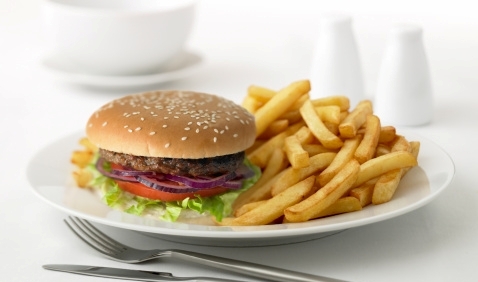Lose Weight > Common Sense To Lose Weight > Common Sense Article > Three Easy And Effective Weight Loss Strategies
Three Easy And Effective Weight Loss Strategies
Easy & Effective Weight Loss Strategies
Applying an effective weight loss strategy is the key to sustained & permanent weight loss. A 'designer' diet is not an effective weight loss strategy.
So, just to help you to get started on a program for losing weight, and to help ensure your success, I'm going to share with you three easy & effective weight loss strategies that will give you confidence and a sense of control over the whole process of losing weight.
How Heavy is It?
Becoming aware of food density is the first of these weight loss strategies that you can use to help you to lose weight.
The energy density of your food is how its calorie content compares to its volume. A food with a high energy density has a lot of calories and not much food (fats, sugars...), while a food with a low energy density has loads of food without many calories. Water, fibre, and fat are the key factors at play here. The majority of fruits and vegetables contain a lot of water so they have lots of volume and few calories. Fibre also provides volume without much in the way of calories so again fruits and vegetables but this time with the addition of whole grains.
A recent study offered participants a variety of meals. They were allowed to eat as much as they wanted. When these meals had a 25% lower energy density the participants ate 24% fewer calories. This meant that they actually ate about 500 calories less per day. If you eat 500 calories less than you normally eat, every day - this amounts to a weight loss of approximately 50lbs in just 12 months.
When this same group were offered smaller portion sizes (25% less than usual) their calorie intake was reduced by around 230 calories.
So when you eat fruits, vegetables, soups and salads you feel fuller longer because there is plenty of bulk, but fewer calories and so weight loss just happens naturally and enjoyably.
And that one tip will probably lose you all the weight you need to lose - but there's more.
A New Look
This is less obviously linked to calories, but it can be equally powerful.
You are probably aware that mood is a factor in over-eating. Certainly most of my weight loss clients report that low mood state - anything from boredom to grief - triggers inappropriate eating behaviours. That brings us to effective weight loss strategy number 2.
Your environment has an impact upon your mood. Now, by environment, I don't mean nature, or the countryside, or the mountains. You cannot change any of that and unless you already live in the middle of it, it can't really help you. No, by environment I mean those circumstances around you over which you can exert some control.
Exerting control recovers a sense of your own power, and a loss of personal power is one of the factors that cause over-eating and weight problems. So what exactly can you exert control over? You can change the dcor of your home. The activity itself is beneficial if you do it yourself, but thinking about colours, wall coverings and decorations is highly stimulating and helps you feel good about yourself. Just rearranging the furniture can create a new perspective and send a powerful message to your subconscious stating that things are going to be different from now on.
More directly connected with the problem is a clearing out and a cleaning of fridge and kitchen food cupboards. This extends to shopping trips where if you leave the tempting and unhealthy options on the supermarket shelves and pick up some delicious fruits instead, then when you are back home, feeling low, you'll pick up an apple, or a pear, or an orange, or a bunch of grapes to help you feel better instead of the denser and unhealthier options that used to be lying around waiting to tempt you away from your commitment.
Time for a Nap
Ensuring you manage a good night's sleep is the third effective weight loss strategy that you can use to help you to lose weight.
You may find this hard to believe but not getting enough sleep makes you fat. There are two hormones within the body (ghrelin & leptin) that affect appetite. These hormones are themselves affected by the quantity and quality of sleep that you have. "When you don't get enough sleep, it drives leptin levels down, which means you don't feel as satisfied after you eat. Lack of sleep also causes ghrelin levels to rise, which means your appetite is stimulated, so you want more food," says Michael Breus PhD from the Atlanta School of Sleep Medicine.
In a University of Chicago study on sleep deprivation the desire for high carbohydrate, calorie-dense food went up by 45%. In a Stanford University study using 1000 volunteers it was established that those who slept less than 8 hours per night had higher levels of body fat, and those who slept least were the heaviest.
So if you aren't sleeping for long enough, engage in more mental and physical stimulation until you get tired enough each day to have a good night's sleep. That way you get to enjoy probably the simplest, and possibly most effective, weight loss strategy - losing weight while you sleep.
Related Articles
-
Master Your Mind - Master Your Body
The body is the servant of the mind. - James Allen According to Dr.
-
A Brief Look At The Damaging Result of Obesity
Dozens of years of study and medical expertise have shown how muc
-
Affects Of Night Eating Syndrome On Weight Loss
Are you someone who consumes more than 50% of your daily intake only a
-
Post pregnancy fat loss tips for moms
If there is one thing that unites all mothers it is the weight g
-
Tummy Fat Can Be Reduced
Burning a large quantity of your uninvit
-
How To Lose 2 Pounds A Day And find out The New You
The particular anxiousness inside realizing how to lose 2 pounds a day
- DON'T MISS
- How To Overcome Muscle Soreness
- 5 Things You Can Do in Your Kitchen to Lose Weight
- Rapid Burn Dual Action Weight Loss System
- Wrong Diets Can Lead To Ineffective Weight Loss
- Tips To Help You Shed Those Stubborn Pounds
- Quick Menopause Weight Gain Relief-Relief Menopause Weight Gain
- Being Lonely Is Not Going to Help You Lose Weight
- Food Combining: The Little-Understood Secret to Optimal Health & Weight Revealed
- YOUR BODY IS A MASTER COMPUTER AND YOU ARE THE PROGRAMMER
- Free Weight Loss Tips For Burning Stomach Fat During The Holidays




